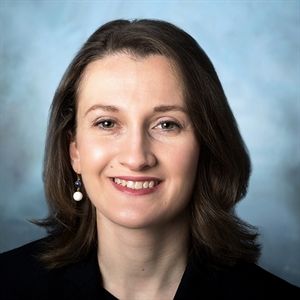News
Article
Faster DME Resolution May Be Linked to More Severe Baseline Retinopathy
Author(s):
However, the meta-analysis of patients treated with ranibizumab suggests a similar proportion of patients achieved DME resolution, regardless of baseline DR severity, by month 24.
Katherine E. Talcott, MD
Credit: ASRS

Results from a meta-analysis of data from individuals treated with ranibizumab suggest resolution of diabetic macular edema (DME) was faster in patients with more severe diabetic retinopathy (DR) at baseline.1
However, the investigative team indicated a similar proportion of patients achieved resolution of DME, regardless of the baseline DR severity, by month 24 of the analysis.
“These findings may guide treatment decisions and inform patient expectations in clinical practice,” wrote the investigative team, led by Katherine E. Talcott, MD, from the department of ophthalmology at Cleveland Clinic.
A better understanding of how long diabetic macular edema (DME) takes to resolve in patients with DR after ranibizumab treatment, as well as the various factors affective those outcomes, could be beneficial to both physicians and patients. Talcott and colleagues set out to evaluate the time to first DME resolution and the impact of baseline DR severity on the outcome in patients treated with ranibizumab in phase 3 clinical trials.
The meta-analysis evaluated data from the phase 3 RIDE and RISE trials, as well as the DR Clinical Research Network protocols I, S, and T.2 The participant population consisted of patients with DME, measured as central subfield thickness (CST) >250 μm and DR with a Diabetic Retinopathy Severity Scale (DRSS) score between 35 and 85. Intravitreal injection of ranibizumab was identified as the intervention in the analysis.
The investigative team noted the main outcome measure was the time to first DME resolution (defined as CST ≤250 µm) with 24 months, overall and by baseline DR severity category per the DRSS (35 of 43 [mild to moderate nonproliferative DR], 47–53 [moderately severe or severe nonproliferative DR], 60 [mild proliferative DR], and 61–85 [moderately severe to severe proliferative DR]).
Overall, a total of 777 patients were included in the meta-analysis. The overall mean time to first DME resolution, adjusted for baseline CST, was 6.0 (95% CI, 5.6–6.4) months. Meanwhile, the analysis showed the mean time to first DME resolution was 7.1 (95% CI, 6.2–7.9), 5.9 (95% CI, 5.2–6.6), 6.0 (95% CI, 4.8–7.2), and 4.5 (95% CI, 3.5–5.5) months for the 35 of 43, 47 to 53, 60, and 61 to 85 baseline DRSS categories, respectively (overall P = .002).
Moreover, by month 21, the analysis showed the proportion of eyes with DME resolution was 74.9% (221 of 295), 77.5% (299 of 386), 69.4% (109 of 157), and 78.7% (148 of 188) for the 35 of 43, 47 to 53, 60, and 61 to 85 baseline DRSS categories, respectively (overall P = .17).
“This meta-analysis of data from patients treated with ranibizumab showed that DME resolution was faster in patients with more severe DR at baseline,” investigators wrote. “However, by month 24, a similar proportion of patients achieved DME resolution, regardless of baseline DR severity.”
References
- Talcott KE, Valentim CCS, Hill L, Stoilov I, Singh RP. Baseline Diabetic Retinopathy Severity and Time to Diabetic Macular Edema Resolution with Ranibizumab Treatment: A Meta-Analysis. Ophthalmol Retina. 2023;7(7):605-611. doi:10.1016/j.oret.2023.02.003
- Nguyen QD, Brown DM, Marcus DM, et al. Ranibizumab for diabetic macular edema: results from 2 phase III randomized trials: RISE and RIDE. Ophthalmology. 2012;119(4):789-801. doi:10.1016/j.ophtha.2011.12.039





